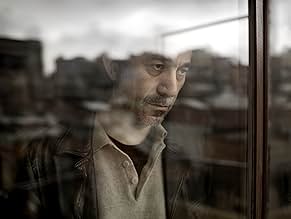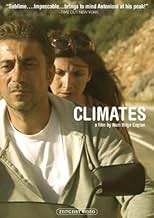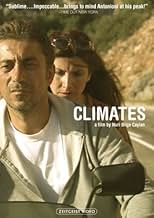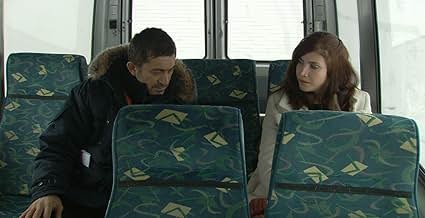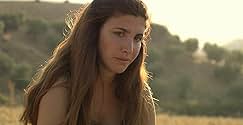IMDb-BEWERTUNG
7,1/10
14.851
IHRE BEWERTUNG
Füge eine Handlung in deiner Sprache hinzuDowdy university instructor Isa is an inattentive husband to his younger, TV-business wife Bahar. Self-absorbed, Isa only communicates in the most rudimentary way, while she, similarly, deta... Alles lesenDowdy university instructor Isa is an inattentive husband to his younger, TV-business wife Bahar. Self-absorbed, Isa only communicates in the most rudimentary way, while she, similarly, detaches into crying jags and juvenile behavior.Dowdy university instructor Isa is an inattentive husband to his younger, TV-business wife Bahar. Self-absorbed, Isa only communicates in the most rudimentary way, while she, similarly, detaches into crying jags and juvenile behavior.
- Regie
- Drehbuch
- Hauptbesetzung
- Auszeichnungen
- 12 Gewinne & 12 Nominierungen insgesamt
Nazan Kesal
- Serap
- (as Nazan Kirilmis)
Emin Ceylan
- Isa'nin Babasi
- (as M. Emin Ceylan)
Apo Demirkubuz
- Dizi Oyuncusu
- (as Abdullah Demirkubuz)
Empfohlene Bewertungen
As in KASABA, Nuri Bilge Ceylan's first major feature, İKLİMLER (CLIMATES) is structured around the seasons. The action begins during the height of summer at the seaside resort of Kaş, where İsa (Nuri Bilge Ceylan) and his partner Bahar (Ebru Ceylan) agree to separate, as they believe they have nothing to give to their relationship. The action shifts to autumn in İstanbul, where it rains perpetually and İsa tries to continue his career as a university educator while having occasional flings with Serap (Nazan Kırılmış). The film's third act shifts to the eastern Turkish city of Doğubeyazit, where Bahar works on a television program; despite the twin disadvantages of blizzards and high winds, İsa tries his best to patch up his relationship with Bahar.
The natural settings (or "climates") of the film comment on the state of İsa's mind. Despite cloudless skies and a calm sea (suggesting openness and/or happiness) İsa's mood remains perpetually melancholy; unable to communicate his feelings or establish any contact - either emotional or physical - with Bahar, he is imprisoned by pride. The rains of İstanbul that plash on the windows sum up his perpetual unhappiness, as he vainly searches for a new relationship. The winter snows of Doğubeyazit have a similar function as the snows in UZAK; they symbolize İsa's frozen soul as he tries and fails to improve his existence.
İKLİMLER revisits the themes now characteristic of Ceylan's work: the inability of individuals to communicate with one another, the ways in which words are used to obscure rather than facilitate meaning. The script is a sparse one; for much of the time we see the characters looking to the left and the right of the camera without speaking. We would love to know what they think, but Ceylan will not give us that privilege. When the characters do speak - for example, when İsa promises to change if Bahar returns to him, they do so in clichés.
Yet the overall tone of İKLİMLER is a little more bitter as compared to UZAK, for instance. There is a long and savage sex scene between İsa and Serap, where the protagonists seem almost animal-like with their guttural grunts and gasps for breath. İsa seems hell-bent on dominating Serap through sheer force, as he pins her to the ground and forces himself on to her. If words have no meaning, it seems, then human beings behave like beasts. In light of such knowledge, we understand that İsa's personality will never change, despite his protestations to the contrary.
İKLİMLER once again makes pertinent comments about the media, and the ways in which people use it to shy away from rather than confront experience. İsa is shown taking photographs of ancient sites; for him it's the technology that matters, not the experience of communing with the ghosts of the people who once lived there. Likewise Bahar works as an art director on a television series, where all emotions are false and/or contrived, dependent on a director's whim rather than on human feelings. There is one sequence where a young couple (Ceren Olcay, Abdullah Demirkubuz) are shown re-enacting a sequence beside a grave for the cameras, that forms a pertinent contrast to İsa and Bahar's relationship.
The film employs the narrative style now characteristic of Ceylan's work, with viewers encouraged to focus on aspects of the mise-en- scene rather than simply following the story. Lengthy shots are interspersed with close-ups and two-shots, while the use of repeated shots (for example, close-ups of characters smoking cigarettes) are employed to suggest sterility within the protagonists' lives.
Perhaps İKLİMLER lacks the sheer visual bravado of a film like UZAK, but it is a powerful experience to watch all the same.
The natural settings (or "climates") of the film comment on the state of İsa's mind. Despite cloudless skies and a calm sea (suggesting openness and/or happiness) İsa's mood remains perpetually melancholy; unable to communicate his feelings or establish any contact - either emotional or physical - with Bahar, he is imprisoned by pride. The rains of İstanbul that plash on the windows sum up his perpetual unhappiness, as he vainly searches for a new relationship. The winter snows of Doğubeyazit have a similar function as the snows in UZAK; they symbolize İsa's frozen soul as he tries and fails to improve his existence.
İKLİMLER revisits the themes now characteristic of Ceylan's work: the inability of individuals to communicate with one another, the ways in which words are used to obscure rather than facilitate meaning. The script is a sparse one; for much of the time we see the characters looking to the left and the right of the camera without speaking. We would love to know what they think, but Ceylan will not give us that privilege. When the characters do speak - for example, when İsa promises to change if Bahar returns to him, they do so in clichés.
Yet the overall tone of İKLİMLER is a little more bitter as compared to UZAK, for instance. There is a long and savage sex scene between İsa and Serap, where the protagonists seem almost animal-like with their guttural grunts and gasps for breath. İsa seems hell-bent on dominating Serap through sheer force, as he pins her to the ground and forces himself on to her. If words have no meaning, it seems, then human beings behave like beasts. In light of such knowledge, we understand that İsa's personality will never change, despite his protestations to the contrary.
İKLİMLER once again makes pertinent comments about the media, and the ways in which people use it to shy away from rather than confront experience. İsa is shown taking photographs of ancient sites; for him it's the technology that matters, not the experience of communing with the ghosts of the people who once lived there. Likewise Bahar works as an art director on a television series, where all emotions are false and/or contrived, dependent on a director's whim rather than on human feelings. There is one sequence where a young couple (Ceren Olcay, Abdullah Demirkubuz) are shown re-enacting a sequence beside a grave for the cameras, that forms a pertinent contrast to İsa and Bahar's relationship.
The film employs the narrative style now characteristic of Ceylan's work, with viewers encouraged to focus on aspects of the mise-en- scene rather than simply following the story. Lengthy shots are interspersed with close-ups and two-shots, while the use of repeated shots (for example, close-ups of characters smoking cigarettes) are employed to suggest sterility within the protagonists' lives.
Perhaps İKLİMLER lacks the sheer visual bravado of a film like UZAK, but it is a powerful experience to watch all the same.
A director-as an artist-may choose to tell his story by using different parameters i.e.eloquent treatment of dialogue,scenery,costumes,soundtrack and sometimes visual effects. Another may yet choose to tell his/her story using spare plot,minimal dialogue,long still shoots and creative atmosphere.
Three-time Cannes winner director,actor,photographer Nuri Bilge Ceylan follows the second path...
*Spoiler*
A sequel to Uzak,Iklimler,very simply is about a middle-aged academic still writing his thesis and his younger wife(director himself and his real-life wife Ebru Ceylan)who pass through the seasons in their marriage.As the story moves on-from summer to fall then to winter-we see the scenery and locations change in parallel with their inner conflicts.The couple cannot reconcile; separation and break-up is unavoidable at the end.
*Spoiler
Ceylan,with almost a Tarkovskian approach tells his story in the manner of a true auteur he is.
Three-time Cannes winner director,actor,photographer Nuri Bilge Ceylan follows the second path...
*Spoiler*
A sequel to Uzak,Iklimler,very simply is about a middle-aged academic still writing his thesis and his younger wife(director himself and his real-life wife Ebru Ceylan)who pass through the seasons in their marriage.As the story moves on-from summer to fall then to winter-we see the scenery and locations change in parallel with their inner conflicts.The couple cannot reconcile; separation and break-up is unavoidable at the end.
*Spoiler
Ceylan,with almost a Tarkovskian approach tells his story in the manner of a true auteur he is.
This film was really impressive (I agree with everything localdj2001 said), and much better than I expected. I saw it at the Melbourne Film Festival to a capacity audience.
Some people cannot enjoy a film if they cannot feel for the characters. If so, this is not the film for you. The characters are all flawed, and not particularly likable (kudos to the director/actor for allowing himself and his wife to be portrayed in this manner).
We have a reasonable size established Turkish community in Melbourne. This film introduced me to a more modern view of the Turkish that we don't see here. Culturally, it was very interesting.
The film reeks with emotional honesty. It is mature, adult cinema. The story is somewhat cryptic as there are aspects of a collapsing relationship that are never revealed. But unfolding events reveal that everything is not what it seems. And real life is like this - we see something and think we know, but we only know the little glimpse we have seen.
What is said in this film is sparse but interesting. And what is not said is just as interesting. There are very long takes, some of which nothing much seems to happen. In others, there is much happening.
The title is very clever because it adds weight to the background of the film, which is the changing seasons. The cinematography was really stunning, especially at the end. Lighting was terrific. The film lingers long after the credits.
This is the first film I have seen by this director, but he is surely very accomplished. If very high quality, intelligent, artful European cinema is your taste, go see this.
Some people cannot enjoy a film if they cannot feel for the characters. If so, this is not the film for you. The characters are all flawed, and not particularly likable (kudos to the director/actor for allowing himself and his wife to be portrayed in this manner).
We have a reasonable size established Turkish community in Melbourne. This film introduced me to a more modern view of the Turkish that we don't see here. Culturally, it was very interesting.
The film reeks with emotional honesty. It is mature, adult cinema. The story is somewhat cryptic as there are aspects of a collapsing relationship that are never revealed. But unfolding events reveal that everything is not what it seems. And real life is like this - we see something and think we know, but we only know the little glimpse we have seen.
What is said in this film is sparse but interesting. And what is not said is just as interesting. There are very long takes, some of which nothing much seems to happen. In others, there is much happening.
The title is very clever because it adds weight to the background of the film, which is the changing seasons. The cinematography was really stunning, especially at the end. Lighting was terrific. The film lingers long after the credits.
This is the first film I have seen by this director, but he is surely very accomplished. If very high quality, intelligent, artful European cinema is your taste, go see this.
I just saw the film here in Chicago as part of the city's International Film Fest, and I have a few feelings left hanging around. True, Ceylan's films tend to be slow and he often leaves his character's unsatisfyingly shallow (see "Uzak," an even slower film than this one). But what leaves me intrigued is just this - the fact that he doesn't develop his characters. In "Climates," there are many close up shots which linger, leaving the characters suspended on the screen to be themselves, and these script-less glimpses of them speak volumes to me actually. So yes, in terms of how much is GIVEN to us as an audience, the characters are wanting. But in terms of how much we can construct in our minds, I feel the sky's the limit. I also found the generational difference between Bahar, the young wife, and the other few characters we're introduced to to be quite heavy. For while the other few people we see are all disillusioned by life and lazily struggle with it in the safe realms of their relative bourgeois lives, she seems to be the only one who sees something wrong with the whole picture. The catch is that while she sees through it, she also feels disillusioned by how wrong all the wrongs are, and so she keeps it to herself and simply starts crying. Interspersed throughout the film are subtle focuses on tiny details, like a bee, or snow flakes, which really highlight a rather poetic quality to the film. Overall I found the film to be falsely shallow. Audiences with short attention spans be warned!
The films of Michelangelo Antonioni will either bore you to death or captivate you in the most subtle of ways. I fall into the latter category and am profoundly influenced by his work and the filmic conventions integral to them. It was my discovery of Antonioni's work that led to my discovery of New German Cinema, both of which ultimately shaped the way I watched and interpreted films. Brought up on a steady diet of Hollywood movies, I was conditioned to be a passive viewer, one swept away by movies made solely for entertainment purposes. In many ways I still am that little boy who gets lost in the fantasy world on the silver screen, but as an adult I've learned the films that truly make me feel alive are the ones forcing me to be an active participant in what is being projected before me. In other words, films that challenge me by asking questions in lieu of providing absolutes.
Nuri Bilge Ceylan's is an Antonioni disciple and his 2006 film Climates is unmistakably an Antonioni clone. From the story of a couple's dissolving relationship on vacation (one part L'Avventura one part La Notte) right down to the compositions of every shot and the very deliberate pacing, Ceylan wears his influence with pride. Cinematographer Gokhan Tiryaki beautifully frames every shot, where the meticulous compositions are allowed to play out in patient long takes. As it is with Antonioni's films, the minimal use of editing allows the viewer to study things they normally wouldn't get a chance to even consider. Things like landscape, diegetic sounds and subtleties expressed by the actors, all take on heightened significance where, ultimately, this minutiae plays a crucial role filling in the blanks predominant throughout the film. In other words, films like Ceylan's and Antonioni's challenge their viewers to think, to read between the lines and to actively search for context, meaning and subtext within every frame of their films.
As much as I love to revisit the thrills of my youth with standard Hollywood fare, nothing bests a filmgoing experience where I'm not only expected to think and feel as an adult, but am forced to act like one. What an interesting world we'd live in if the blockbusters were all films designed for adults.
http://eattheblinds.blogspot.com/
Nuri Bilge Ceylan's is an Antonioni disciple and his 2006 film Climates is unmistakably an Antonioni clone. From the story of a couple's dissolving relationship on vacation (one part L'Avventura one part La Notte) right down to the compositions of every shot and the very deliberate pacing, Ceylan wears his influence with pride. Cinematographer Gokhan Tiryaki beautifully frames every shot, where the meticulous compositions are allowed to play out in patient long takes. As it is with Antonioni's films, the minimal use of editing allows the viewer to study things they normally wouldn't get a chance to even consider. Things like landscape, diegetic sounds and subtleties expressed by the actors, all take on heightened significance where, ultimately, this minutiae plays a crucial role filling in the blanks predominant throughout the film. In other words, films like Ceylan's and Antonioni's challenge their viewers to think, to read between the lines and to actively search for context, meaning and subtext within every frame of their films.
As much as I love to revisit the thrills of my youth with standard Hollywood fare, nothing bests a filmgoing experience where I'm not only expected to think and feel as an adult, but am forced to act like one. What an interesting world we'd live in if the blockbusters were all films designed for adults.
http://eattheblinds.blogspot.com/
Wusstest du schon
- WissenswertesThis is the first and only movie of director Nuri Bilge Ceylan as an actor.
- SoundtracksPiano Sonata in F minor, K. 466
Composed by Domenico Scarlatti
Top-Auswahl
Melde dich zum Bewerten an und greife auf die Watchlist für personalisierte Empfehlungen zu.
- How long is Climates?Powered by Alexa
Details
- Erscheinungsdatum
- Herkunftsländer
- Offizielle Standorte
- Sprache
- Auch bekannt als
- Iklimler - Jahreszeiten
- Drehorte
- Patara Beach, Gelemis, Antalya, Türkei(beach scene)
- Produktionsfirmen
- Weitere beteiligte Unternehmen bei IMDbPro anzeigen
Box Office
- Bruttoertrag in den USA und Kanada
- 119.958 $
- Eröffnungswochenende in den USA und in Kanada
- 9.665 $
- 29. Okt. 2006
- Weltweiter Bruttoertrag
- 1.385.085 $
- Laufzeit1 Stunde 38 Minuten
- Farbe
- Sound-Mix
- Seitenverhältnis
- 1.85 : 1
Zu dieser Seite beitragen
Bearbeitung vorschlagen oder fehlenden Inhalt hinzufügen


